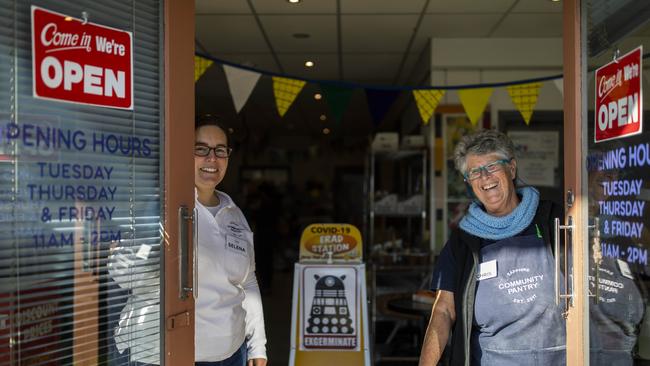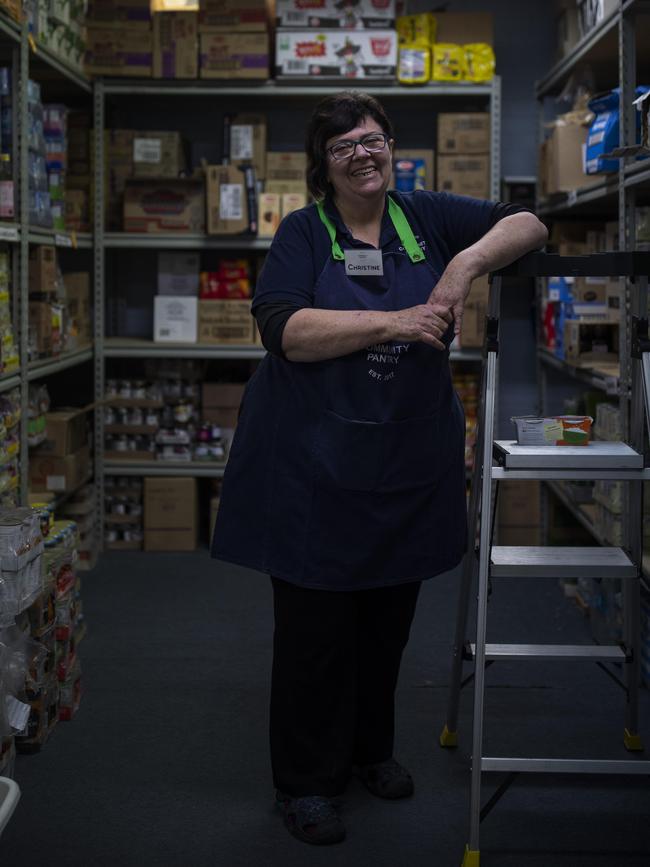Coronavirus: Bega food pantry serves communities fighting back from bushfires
A Bega charity offers dignity and choice along with food supplies to communities still finding their way after last summer’s devastating bushfires

When Christine Welsh and Peter Buggy made the tree change from Sydney to Bega a few years back, the 60-somethings were distressed by what they found alongside the stunning landscape and holiday homes on the NSW south coast.
There was poverty, disability and real need and the couple who had worked in the public service and IT set their minds to helping.
In 2017 with some shop space donated by the Salvation Army, they launched the Sapphire Community Pantry, buying food from the national charity Food Bank for resale to locals.
The food is cheap: a $2 chocolate bar, for example, sells for 60c.
“You spend $10 with us and you get about $60 worth of produce,” said Ms Welsh.
The business model allows the pantry to operate without philanthropy but it seeks government grants at times and this week received $50,000 from the Commonwealth Bank. That will pay for a customised van to drive to villages around Bega, including the bushfire-devastated Bemboka to sell food directly to people still suffering from the summer crisis.
“People are afraid to leave their homes, they are afraid to leave their villages, some don’t have a car or money,” said Ms Welsh.
The pantry model gave people choice and dignity rather than receiving free food, she added. People can join as a member for $2 a year and receive a 5 per cent discount — although this year the membership fee has been waived because of COVID-19.

The pantry is now in a bigger, rented space just off Bega’s main street. It opens three days a week and as well as selling food, operates as something of a community centre with a no-charge coffee shop, IT training for older people, cooking classes and “adulting classes” for young people, explaining everything from dealing with bureaucratic forms to changing a tire.
Most activities — except the food sales — have been suspended during the lockdown and Welsh admits that the past few months, including the New Year’s Eve bushfires, have taken a toll.
“It is going to get worse,” she said. “We are getting burnt out, depression is a constant battle for many people. We do have access to counselling, but when you are in a bushfire, you don’t know if you are going to live, so the trauma carries on and is retriggered by simple things, such as smells or images.”
The difficulties some villages in the area have faced in getting financial help since the fires has been well documented. Ms Welsh said “It’s a puzzle to me too” why money has not got through.
In some cases, she said, people did not have access to computers and the internet to apply for help. Even if they did, reliving the trauma each time they applied to different agencies was a problem.
“At one stage Bega Valley Shire Council got people to fill out forms and it was assumed this would be shared with other agencies but it wasn’t,” Ms Welsh said. “I think there are heaps of data bases around the country that are not talking to each other. Sometimes there was too much aid that was the wrong aid, or the timing was wrong.”
Some people did not have home insurance because they had bought land and built houses that probably did not comply with regulations and thus could not be insured, or they had built before the strict building requirements had been introduced. Many were now struggling because it would cost them a great deal to rebuild and meet new regulations.
Many had no option but to stay on their land without heating, water or sewerage because they had animals to care for. Renting in the nearby towns was not a realistic option because of the high cost and scarcity of rentals in the region.
Ms Welsh said she worried that some of those affected by the fires were not able to deal with complicated application forms but did not want to admit this and ask for help.
The good news is that local, unpaid leaders have emerged to help locals.
“There are some wonderful local women leaders,” she said. “But where’s the government in all of this?”
She said there were some big, city-centric charities trying to assist but sometimes they did not communicate or consult with people on the ground.
“Often they duplicate resources or provide the wrong help at the wrong time,” she said.
See The Australian’s special series on working during COVID-19 here




To join the conversation, please log in. Don't have an account? Register
Join the conversation, you are commenting as Logout